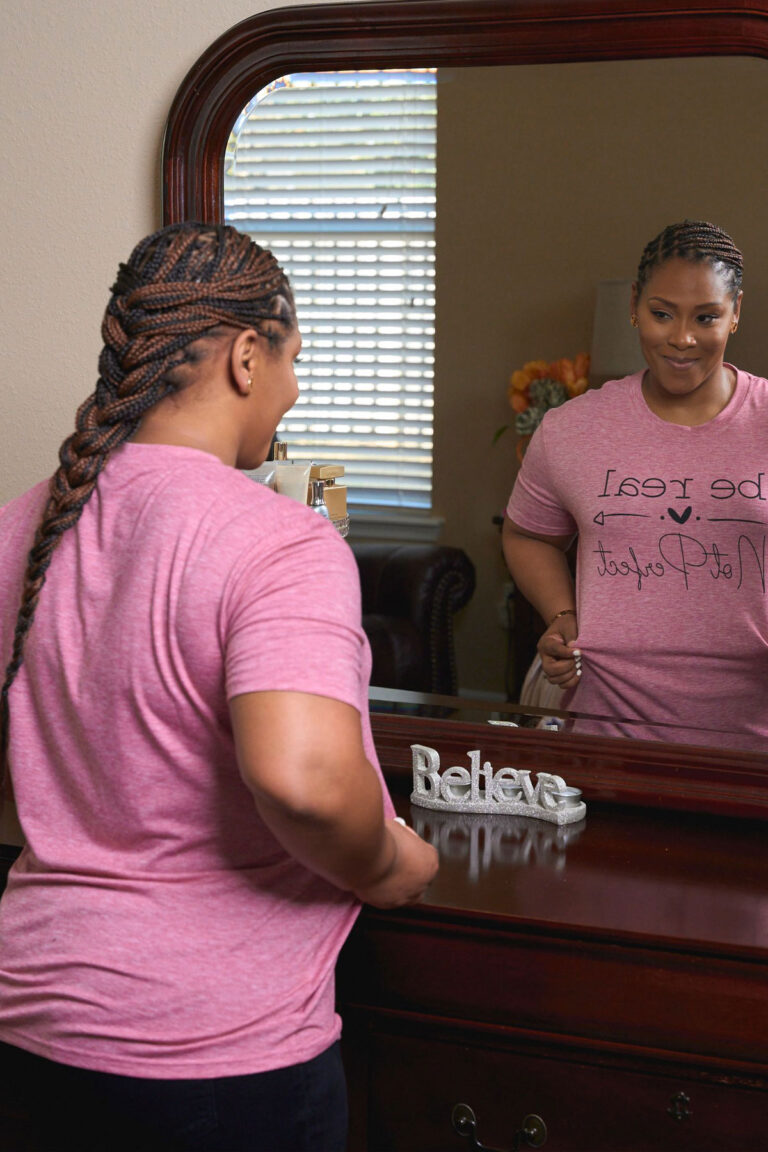Mom’s Guide to Positive Self-Talk

Shaping Our Children’s Mindset
Hey there, Thriving Mamas! I was recently inspired by a conversation with a wonderful children’s author. We discussed the importance of positive self-talk as it relates to our children. However, we explored beyond simply affirming our kids; we delved into raising confident children. It’s not only about what we tell them but also about listening to how they see themselves. This deep exchange reminded me of my own journey, from a confident child to an adult who wrestled with self-doubt and low self-esteem.
My Personal Journey
I’m here to share a personal story that many of us know very well, yet often keep to ourselves. As a young girl, confidence was my second nature. Each day was an adventure, faced with boldness and excitement. However, as I navigated adulthood’s twists and turns, my inner strength started to flicker. This change was more pronounced when I embraced motherhood. Body changes and mental health challenges further shook my self-confidence. But here’s what I’ve learned: positive self-talk can be a game-changer. It’s not just about feeding our minds with affirmations but truly believing in them, for our sake and our children’s. Join me as we explore the transformative power of positive self-talk in shaping our children’s mindset and rediscovering our own inner strength.
The Science Behind Positive Self-Talk in Motherhood
The importance of positive self-talk, especially for us as mothers, is underscored by numerous psychological studies. Research in the field of cognitive psychology suggests that self-talk can significantly influence our emotions and behaviors. It is well documented that self-affirmations can buffer stress and improve problem-solving skills in low performing, chronically stressed individuals. This aspect of self-affirmation becomes even more critical when considering its impact on our children. Our self-dialogue doesn’t exist in a vacuum; it forms a blueprint for how our children learn to talk to and about themselves.
The Ripple Effect on Children
Being a mom to two young girls has taught me the power of words, especially when it comes to how I speak about myself around them. They look up to me; in their eyes, I’m more than just their mom – I’m a role model. My oldest often showers me with compliments. She sees beauty in me that I sometimes forget to see in myself. She loves to mirror my hairstyle, wear dresses like mine, and these moments make me realize how much impact I have on her, often without even trying.
I’ve learned how crucial it is to choose my words wisely. Whether it’s a casual remark about my appearance or an offhand comment about my abilities, I know she’s listening. And not just listening, but often, she’s taking these words as cues on how to view herself.
Children are incredibly perceptive. They watch us, learn from us, and often, they mirror us. The way we talk about ourselves can lay the groundwork for how they see and speak about themselves. This isn’t just a personal observation; it’s backed by research. Developmental psychologists have long pointed out the influence parents have on their child’s developing self-esteem and resilience. For instance, several research studies show a significant connection between the emotional language parents use and how well children manage their feelings and social interactions.
This knowledge serves as a powerful reminder for me. Every word, every expression of self-love or self-criticism, doesn’t just affect me; it shapes the way my daughters will see themselves in this world. It’s a responsibility I hold dear, knowing that my approach to self-talk can leave lasting imprints on their young minds.
Shaping a Positive Mindset: Practical Steps
Awareness and Mindful Adjustment
The journey to a positive mindset begins with self-awareness. A strategy I’ve learned by participating in cognitive behavioral therapy is to recognize negative self-talk as a first step to change. For me, this meant catching myself when I slipped into patterns of doubt and criticism, especially during my transition into motherhood. The key is not just noticing these thoughts but actively replacing them with positive, self-compassionate statements. This shift in dialogue can significantly alter our emotional responses and stress levels.
Consistent Modeling of Positive Self-Talk
Our children are always listening and learning from us. They develop self-concepts based on their observations of how adults, especially parents, perceive themselves. Using empowering affirmations like ‘I am resilient,’ ‘I am worthy,’ openly in front of our children teaches them the language of self-love and self-respect. This was a conscious practice I adopted, especially during times when my self-esteem wavered post-pregnancy.
Encouraging Children’s Positive Self-Talk
When children voice self-doubt or criticism, it’s an opportunity for us to guide them towards positive self-statements. Research has shown that children who engage in positive self-talk can better manage stress and are more resilient in challenging situations. By gently guiding our kids to reframe negative thoughts, we aid in developing their emotional resilience. I make it a point to affirm my children’s worth and abilities, especially when they face setbacks.
Cultivating a Positive Family Environment
The environment in which children grow plays a pivotal role in their emotional and psychological development. Creating a space where positive affirmations are the norm contributes to a supportive atmosphere. This can include displaying motivational quotes, reading uplifting stories, and engaging in positive conversations. A positive home environment, filled with encouraging words and attitudes, can promote better mental health in children. In our home, we’ve incorporated positive affirmations into our decor and daily routines, making encouragement a constant presence.
Celebrating the Small Victories
Acknowledging and celebrating achievements, no matter how small, is crucial. Recognizing small successes builds a mindset of growth and gratitude, both for adults and children. This practice has been a game-changer for me, especially in moments of self-doubt. It has helped me and my children to focus on progress rather than perfection, creating a sense of accomplishment and positivity.
Navigating Through the Challenges
Throughout my journey, there have been moments where positive self-talk felt like an insurmountable task. The physical changes post-pregnancy, coupled with the overwhelming responsibilities of motherhood, often led me to question my capabilities. It was during these times that I leaned on the power of positive self-talk the most. Even when it didn’t feel natural, I reminded myself of my strengths, resilience, and worthiness, not just for my sake but for my daughters, who look to me as their role model.
Embracing Support and Seeking Help
In our journey as mothers, it’s essential to recognize when we need help. If negative self-talk becomes a persistent challenge, professional support can offer new coping strategies and perspectives. Remember, seeking help is a sign of strength and a step towards a healthier mindset for you and your children. Keep visiting our blog for more inspiration and support in being the best mom you can be. Together, let’s commit to nurturing a positive mindset, creating a legacy of resilience and self-love for ourselves and our children.







Wow! This is powerful and so encouraging. Love the candor and the doable steps we can all take to be kinder to ourselves for ourself and for our children. Thank you so much for sharing!